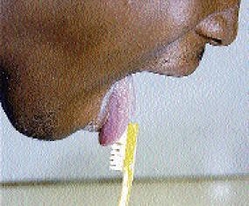Bad breath is a certainty for everyone at some point in time, and learning how to freshen up or taking heed in case it's an indication of a more serious problem is very important.
Bad breath or halitosis can originate from the mouth, the nose and even from the stomach, according to Horace Freeman, dental officer for the Jamaica Defence Force.
Bacteria on the tongue
"The most common area is the back of the tongue," said Dr Freeman. This area can be a storehouse for bacteria which eventually cause bad breath because it is dry and often neglected when brushing seeing that it is hard to reach.
A toothbrush may help to spread the bacteria so it is recommended that one uses a tongue scraper or a spoon to scrape the area, if you can do it without gagging, said Dr Freeman. If you use neither, it is best to go with the toothbrush.
Morning breath - "When you sleep your salivary glands slow down," Dr Freeman said, further explaining that when sufficient saliva isn't being produced it causes bad breath. But it's nothing brushing your teeth and flossing cannot fix. "That (bad breath) usually passes when you wake up and start drinking and brushing," he said.
Not flossing - Neglecting between the teeth can also contribute to an unpleasant smell. "If you don't floss you are going to get plaque build-up and bacteria which rot the food," he said. So nothing beats flossing every time one brushes.
Eating garlic and onions
Eating foods like garlic and onions can also result in unpleasant breath. "The odours are given off in the lungs," Dr Freeman said, and eventually work their way through the mouth.
Other health issues
Having sinusitis or a post-nasal drip can also contribute to this. Sinusitis can oftentimes be treated with antibiotics but if the problem persists, some may have to see an ear, nose and throat specialist.

Having low salivary flow - Saliva helps to wash away food particles which bacteria can often feed on, which results in bad breath. Low salivary flow can also be caused by taking certain medications. To combat this temporary dry mouth: "Make sure you are well hydrated," he said. Chewing sugar-free gum also promotes saliva production.
An indication of periodontal/ gum disease - Persistent bad breath may also point to a bigger problem like periodontal (gum) disease. "It has a very distinctive smell. I can almost identify it from across the room," he said. A decaying tooth may also be the culprit.
Individuals need to visit a dentist to get regular dental check-ups to identify such problems. One of the first symptoms of gum disease is bleeding gums without pain. This happens in the initial stages of the disease.